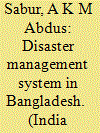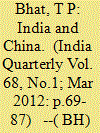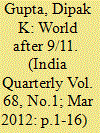|
|
|
Sort Order |
|
|
|
Items / Page
|
|
|
|
|
|
|
| Srl | Item |
| 1 |
ID:
112418


|
|
|
|
|
| Publication |
2012.
|
| Summary/Abstract |
Bangladesh and its people have been one of the worst victims of natural disasters from time immemorial. Conversely, facing and learning to live with natural disasters are equally an ancient preoccupation of Bangladeshi people. Disaster management in independent Bangladesh has undergone a complex process of development. While it received its impetus from concrete challenges faced at home, it also received inputs from developments, institutions and policies outside Bangladesh. In the process, Bangladesh has developed a workable system of disaster management that includes a set of mechanisms and processes, as well as a whole range of ways and means for the management of disasters. The article probes into the disaster management system in Bangladesh. In doing so, it begins with an overview of disasters in Bangladesh that helps explain the context of disaster management. The article studies the disaster management system in Bangladesh with a focus on concepts and theories, legal framework and institutional structure. On the basis of the above, an attempt is made to project an outlook for the future. Disaster and disaster management transcend and intersect national boundaries and geographical regions. Therefore, prevailing system of disaster management in Bangladesh could be of considerable importance to others involved in the same venture elsewhere in the world.
|
|
|
|
|
|
|
|
|
|
|
|
|
|
|
|
| 2 |
ID:
112417


|
|
|
|
|
| Publication |
2012.
|
| Summary/Abstract |
India's role in Sri Lanka assumes more significance now than before, with the end of war and devolution of power sharing in limbo. While the LTTE is wiped out militarily and isolated internationally, the existing militarisation in Jaffna with war crime charges at UN and awaiting political solution in limbo, Sri Lanka demands India's attention. The call for India's greater engagement with Sri Lanka had resurfaced domestically with a demand from Tamil Nadu parties urging India to play a more proactive role pertaining to rebuilding and sustaining peace in post-war Sri Lanka, and in ending assault on Indian fisherman at Palk Strait. On other hand, the fostering of ties between Sri Lanka and Pakistan and China push for more primed hands-on role from the point of view of India's long-term strategic interest. There is, therefore, a need to have a re-look of India's policy options towards Sri Lanka in light of recent developments.
|
|
|
|
|
|
|
|
|
|
|
|
|
|
|
|
| 3 |
ID:
112420


|
|
|
|
|
| Publication |
2012.
|
| Summary/Abstract |
India and China share many similarities. In the initial years, both adopted inward-looking import substitution policies with little consideration to foreign trade. During that period, China's foreign trade policy was more regimented than that of India's. As a result, both suffered on account of inefficiency in production and technological backwardness. China's 'open door' policy came into force in 1978, and India adopted liberalisation policies much later in 1991. China's economy grew much faster with an emphasis on export growth and attracting foreign direct investment. India, too, followed this approach in a calibrated manner. Domestic economic reform in China was carried out with a view to join the World Trade Organization (WTO). Entry of China into WTO unfolded trade liberalisation on an unprecedented scale. China's foreign market access enhanced its export growth to a phenomenal level. Now it has become the number one exporter, surpassing the US. India's exports also grew, but not as fast as China's. Trade instrument deployed by both the countries varies in nature and substance. China's export competitive power is well established in the global market, while India is yet to get to that level.
|
|
|
|
|
|
|
|
|
|
|
|
|
|
|
|
| 4 |
ID:
112419


|
|
|
|
|
| Publication |
2012.
|
| Summary/Abstract |
The central argument of this article is that the strong state-centred tradition of Turkey has recently gone out of fashion. The breakdown of authoritarianism and state-centred approach and moving into a successful democratic consolidation and society-centred approach in Turkey requires choices to be made and alliances to be formed among intellectual-bureaucratic elite, the military, political parties, trade unions, other interest groups and various types of societal organisations. One of the most important difficulties for consolidating democracy in Turkey has been the complexity of creating stable, viable, accountable, responsive, predictable, representative, transparent, efficient and problem-solving oriented legitimate institutions where all citizens, regardless of ethnic origin or religious orientation, have a voice and enabling representation in such bureaucratic organs that altogether make-up the institution of state. This article will assert that the forces of democratic transition from a state-centred approach to a society-centred approach in Turkey are based on resolving the two main potentially difficult problems that are related with constant questioning of the legitimacy and democratic consolidation of the state apparatus: ethnic and religious paradoxes.
|
|
|
|
|
|
|
|
|
|
|
|
|
|
|
|
| 5 |
ID:
112416


|
|
|
|
|
| Publication |
2012.
|
| Summary/Abstract |
A decade has passed since the attacks of 9/11. The heightened curiosity about terrorism has seen an avalanche of books and articles in recent years. In this article, after tracing the evolution of research in the area of social conflict, in general, and terrorism, in particular, I attempt to understand if the collected wisdom has altered the views of those who make public policies in the US. However, in a rapidly changing world, some of the old theories of mass mobilisation are becoming obsolete with equal speed. At a time when ideas can spread across the world in the speed of light through the Internet, we may have to have a different methodology for understanding how political movements are formed and how the government can mitigate the risks of politically motivated violence.
|
|
|
|
|
|
|
|
|
|
|
|
|
|
|
|
|
|
|
|
|